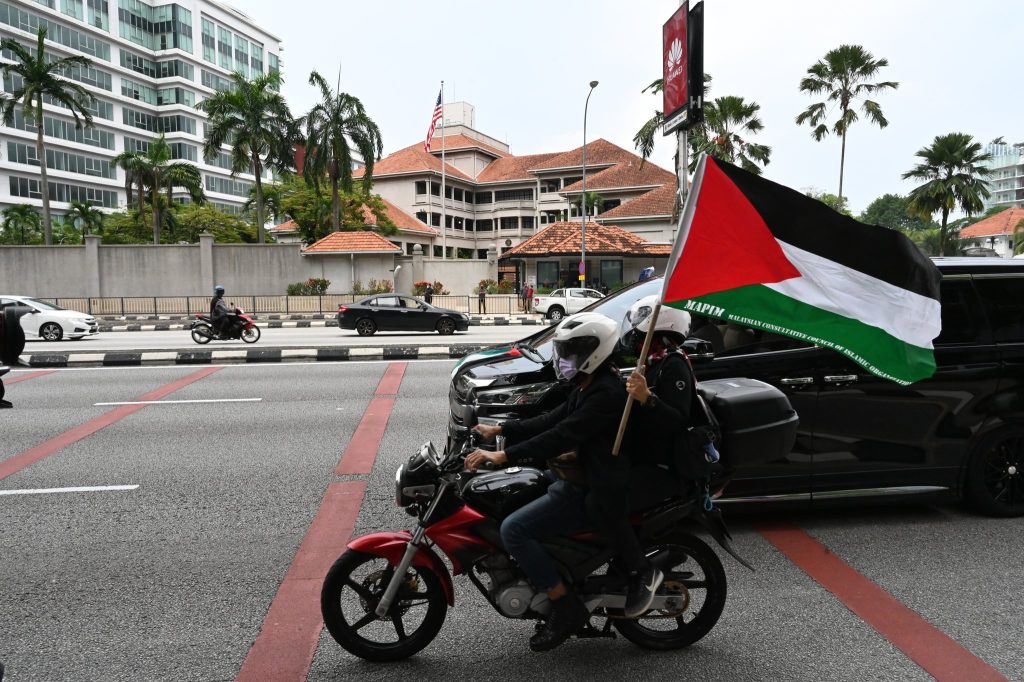Australia/Israel Review
Asia Watch: Hot button issues
May 25, 2023 | Michael Shannon

With elections approaching in six Malaysian states this year, both Prime Minister Anwar Ibrahim’s Pakatan Harapan (PH) and the opposition Perikatan Nasional (PN) multi-party coalitions will be looking to issues that reliably rouse their constituencies towards the polling booths.
In a country where ethnic Malays make up close to 70% of the population – almost all of them being Muslim – any party or coalition aiming for majority support has to play to Malay sensibilities. One of the safest ways to do this is via ritual gestures of support for their global Muslim brethren and denunciations of an agreed-upon bogey figure – the Jewish nation-state of Israel.
Malaysia has, since its inception, staunchly refused to establish diplomatic relations with Jerusalem – a policy that is broadly popular. Even in the unprecedented political instability of recent years, no Malaysian government has deviated from the well-rehearsed arguments on Israel-Palestine.
Regardless, the head of the Malaysia Consultative Council of Islamic Organisations (MAPIM), Mohd Azmi Abdul Hamid, has urged PM Anwar to reject any attempts to normalise diplomatic relations with Jerusalem. Launching the Save Al-Aqsa Fund program on May 9, he said, “There are currently forces that are pressuring Malaysia to normalise relations with Israel. MAPIM are monitoring the situation very closely.
“I need to stress all Muslim nations to never promote diplomatic ties with Israel, they are currently plotting to promote itself in Southeast Asia, with Malaysia and Indonesia being two countries it is highly interested in. Anwar must stand firm and reject any attempts from Israel to pressure us into holding diplomatic ties with them,” he said.
There is no prospect of this. On Dec. 19, soon after becoming PM, Anwar pledged that Malaysia would remain “steadfast” in supporting the “just cause” of the Palestinians, and backed this up recently (May 15) with a statement on Facebook: “To commemorate the 75th anniversary of the Nakba, Malaysia reiterates its unwavering commitment and solidarity towards the Palestinian people in opposing the imperialist policy of the Zionist apartheid regime of Israel which… tramples on humanitarian principles.”
Anwar further called upon the UN Security Council to “ensure that Israel is accountable to the obvious violence and the violation of the international laws and UN Charter every year.” Hardly the language that suggests an imminent rapprochement with Israel.
Indeed, Malaysia is pursuing its stance internationally, with its permanent representative to the United Nations, Ahmad Faisal Muhamad, unanimously elected by the Committee on the Exercise of the Inalienable Rights of the Palestinian People (CEIRPP) to be its vice-chairman and rapporteur. Established by the UN General Assembly in 1975, the CEIRPP forms part of a web of UN bodies that make no pretence of being non-partisan on Israeli-Palestinian issues.
In a statement, Muhamad said the Palestinian people had been “subjected to despair and agony for far too long,” and pledged “Malaysia’s commitment and support for the work of this committee and the realization of the inalienable rights of the Palestinian people to self-determination, national independence, and sovereignty.”
The sum of these items is just more evidence that the “debate” over Israel-Palestine is essentially an echo chamber of broad unanimity. But it remains a hot-button issue, especially for ethnic Malays, where the spectre of hidden, enigmatic Israeli/Jewish hands is regularly invoked for domestic purposes.
Anwar himself has often been targeted in this way. Even after he assumed the Prime Ministership, an opposition MP from the conservative Islam-oriented PAS (Parti Islam se-Malaysia) was accused of spreading rumours that Anwar had “contacted Israel and foreign powers” to secure his appointment. Anwar immediately responded, threatening legal action over the “slander” of being linked to Israel.
While he is still the only Malay leader who espouses multiculturalism and inclusiveness, Anwar’s critics argue that he too has used Islam and pandered to Malay identity politics when his ambitions have required it. He remains vulnerable on his right flank, where Muhyiddin Yassin’s Malay-centric Perikatan Nasional coalition includes PAS, the largest single party in the 222-seat parliament with 43 seats.
PN’s strategy heading into the state elections has clearly been to portray Anwar’s multi-racial and multi-religious Government as anti-Islam and anti-Malay, and the ethnic Malay majority as a community under threat.
A case in point was a Government interfaith project in Kuala Lumpur to give youth a better understanding of Malaysia’s diverse faiths through visits to churches, temples and mosques. PN politicians claimed it was an attempt to spread Christianity among Muslim youth, which predictably provoked outrage from sections of the Muslim majority on social media. The Government suspended the program.
With the six state polls due within the next few months, and saddled with the corruption-tainted UMNO as coalition partner, Anwar’s coalition is vulnerable while most debate is predicated upon who is Malay enough or Islamic enough to gain the support of the majority.






